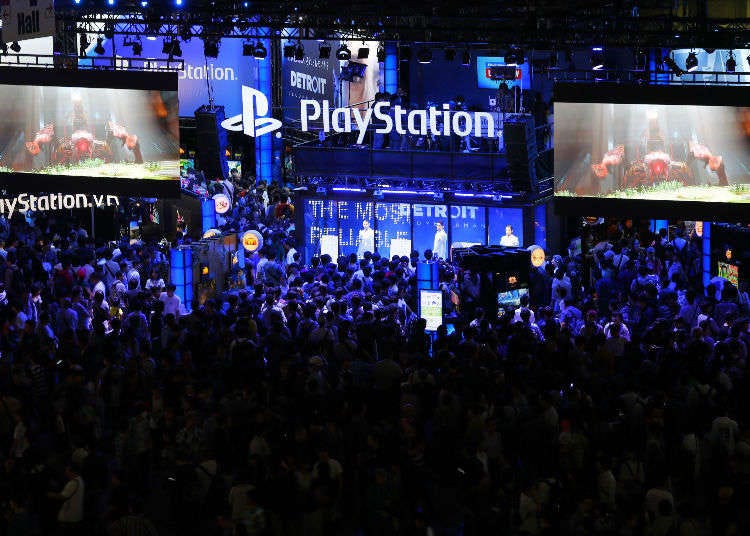
Tokyo Game Show 2019 (September 12-15): “One World, Infinite Joy"
- Written by: Damon Finos
Organized by the Computer Entertainment Supplier's Association (CESA) and Nikkei Business Publications Inc., the Tokyo Game Show first debuted in 1996 and was held twice a year, back when Japan was once the video game capital of the world.
After America stole that title in 2002, the TGS has since been an annual event every September, bringing the growing Asian gaming community closer together, while still showing off some upcoming Western titles.
Following sluggish numbers due to the global recession in 2007, the Tokyo Game Show has continued to expand and break their own records each year. 2018 saw 668 companies and organizations (609 last year) presenting a total of 1,568 game titles from across 41 different countries and regions. Here's our recap from last year's TGS!
"Welcome to the Next Stage"
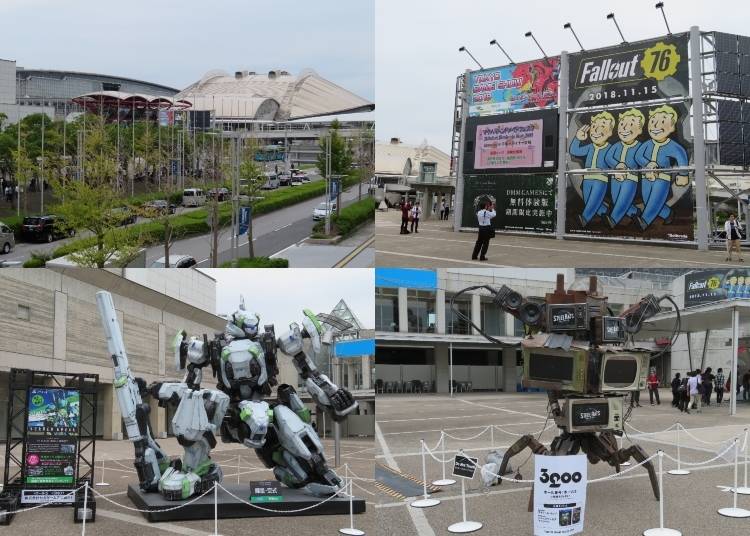
Their theme this year is "Welcome to the Next Stage," which relates to some change-ups in the gaming industry that became evident last year through the explosion of Virtual Reality (VR) hardware and software, and the continuing success of unique Indie Game titles. Also, while TGS has been hosting e-Sports competitions for a few years now, it's only this year that it's been taken more seriously - partly in thanks to Konami Digital Entertainment Co. and their recent sponsorship.
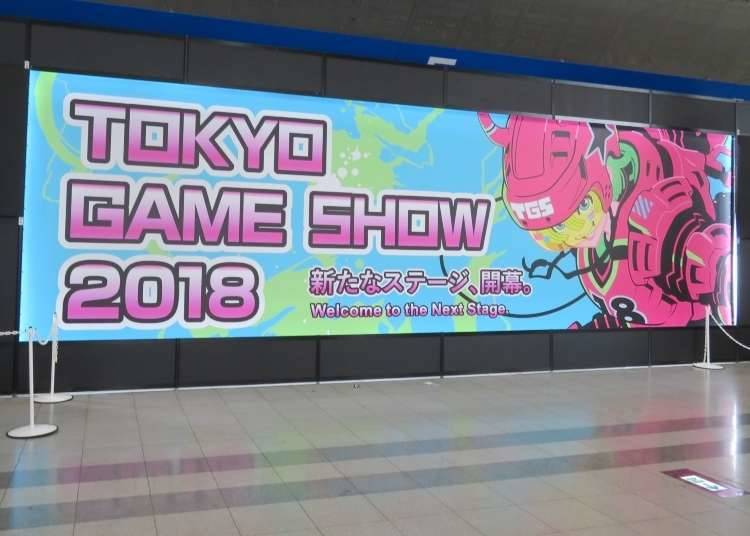
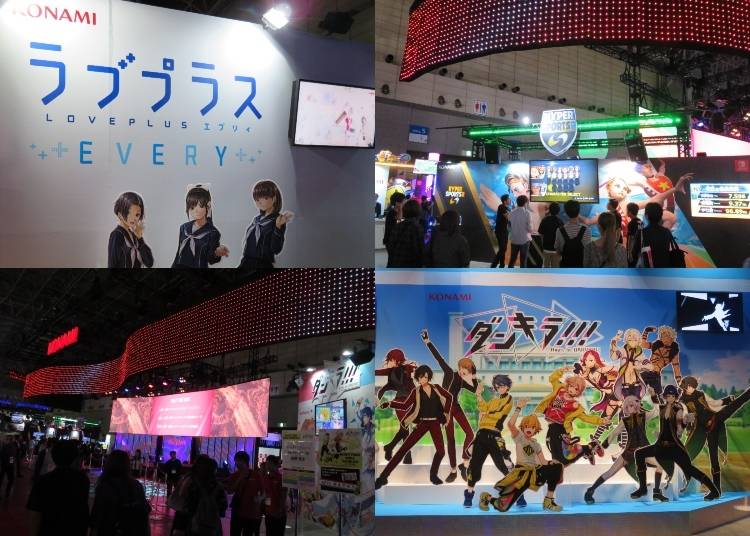
A few years ago, Konami had decided to shift away from console gaming, terminating their business partnership with Kojima Productions (responsible for the Metal Gear series) and instead focus on their more profitable sports gyms, slot machines, and mobile gaming. The Konami booth last year was tiny, demonstrating only two games. Yet in 2018, as I stepped into the main hall of Makuhari Messe, my eyes were first drawn to the massive and visually spectacular Konami booth, ten-times in size, showing off their latest soccer/football game Winning Eleven 2019 for the PS4, their maze-based action party game Super Bomberman R for the PS4 and Nintendo Switch, the platforming adventure sequel La-Mulana 2 for the PS4 and Switch, a new version of their romance-simulation LovePlus Every for the iOS and Android, and many others. It seems that after Konami decided to go full-swing into promoting e-Sports in Japan - going so far as to revise their Winning Eleven 2019 (known as Pro Evolution Soccer 2019 in North America) so to better suit the e-Sports competitions - they are showing signs of returning to the gaming industry.
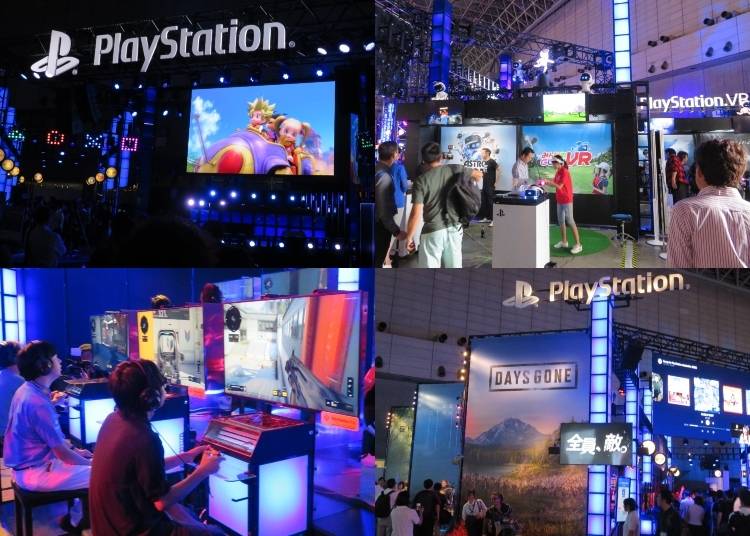
Does this mean they'll be rehiring Hideo Kojima to make a new Metal Gear Solid title? In my humble opinion, probably not.
His Kojima Productions company has been working with Sony Interactive Entertainment (SIE) to complete a new title quite different from the military-stealth game of Metal Gear. The upcoming Death Stranding stars Walking Dead's Norman Reedus, with trailers showing Reedus traversing across a desolate landscape, carrying a fetus in a jar, while hiding from invisible creatures. Little is known about Kojima's Death Stranding - including the release date - though Sony had visuals from the game on display, as well as a life-like statue of Norman Reedus in his gaming costume, where visitors could take their picture.
Ironically, Sony decided to place the Death Stranding promotional area directly next to the Konami booth. I couldn't help but feel this was done on purpose.
Yet the two biggest playable titles at the PlayStation booth were Capcom's Devil May Cry 5 and Square Enix's Kingdom Hearts III.
The last time we saw Dante battling demons was in Devil May Cry 4 which came out shortly after the release of the PS3, in 2008. The action hack-and-slash series returned in 2013 with a prequel titled DmC: Devil May Cry, which was well-received by critics but not by the fans. Now at long last, Capcom has returned after ten years to bring a new sequel into the series. Devil May Cry 5 is set for release on the PS4 and Xbox One on March 8, 2019.
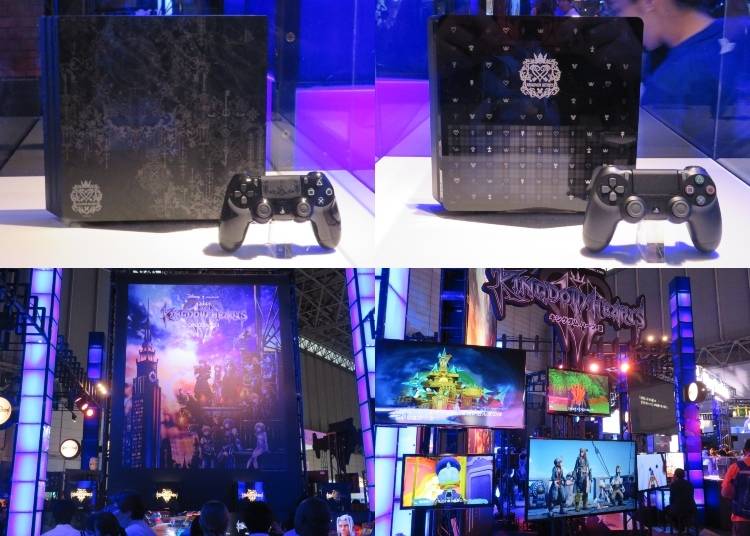
And Square Enix has taken the same path with their Kingdom Hearts series. After multiple remixes, prequels, prologues, and side stories, the action RPG crossover between Square Enix and Disney is finally getting a true sequel with Kingdom Hearts III, set for release in January 2019. The game will feature returning worlds such as Olympus from Hercules and Caribbean from Pirates of the Caribbean, as well as new stories from Big Hero 8 and Toy Story, and a new, original world that has yet to be disclosed.
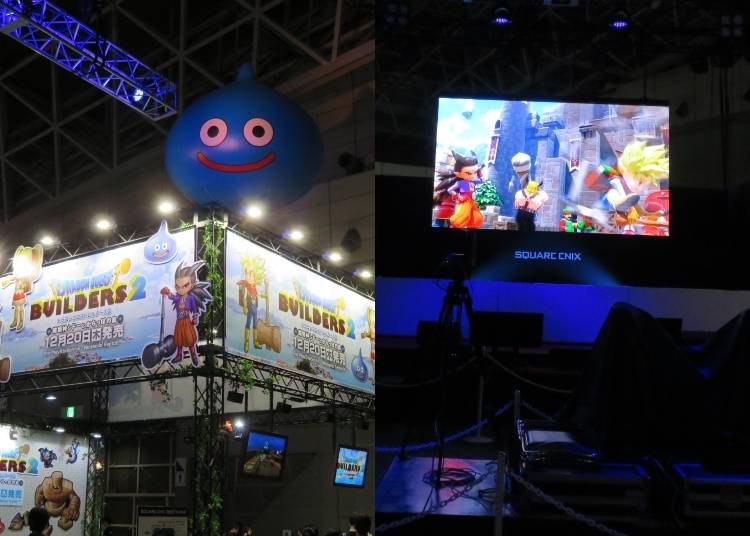
And speaking of Square Enix, they were also demonstrating their new Dragon Quest Builders 2, set for release on December 20 for the PS4 and Switch. Like the previous installment, the game combines the Dragon Quest RPG elements with gathering and collecting, similar to Minecraft. The original game was a commercial success, particularly in Japan and the rest of Asia, and certainly warranted a sequel. Other big titles at the Square Enix booth included the next adventures of Lara Croft in the rebooted Shadow of the Tomb Raider, which was just released six days ago for the PS4 and Xbox One, and a remastered version of the 2008 RPG The Last Remnant, scheduled for release on the PS4 on December 6.
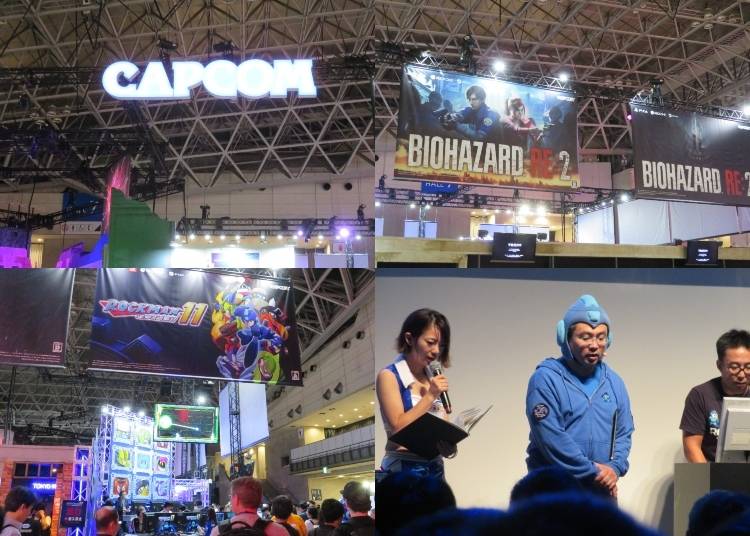
Over at the Capcom booth, Devil May Cry 5 wasn't their only big attraction, nor their remastered version of Biohazard 2 (Resident Evil 2 in English) for the PS4 and Xbox One on January 25. The big event was surrounding the Rockman (Mega Man) character. Visitors were able to get a full demonstration of the latest Rockman 11 scheduled for release on the PS4, Xbox One, and Switch in early October, as well as try the demo which, although currently available in the West, was a first time in Japan.
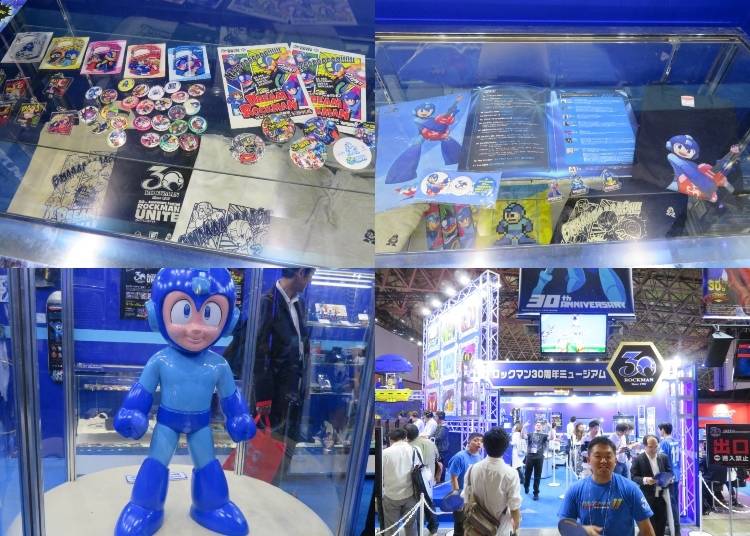
Plus, this year marked the 30th Anniversary of the platforming-shooter Rockman series, and Capcom had a separate booth which showcased the game's history, as well as commemorative coins, illustrations, and figures - most of which were available for purchase.
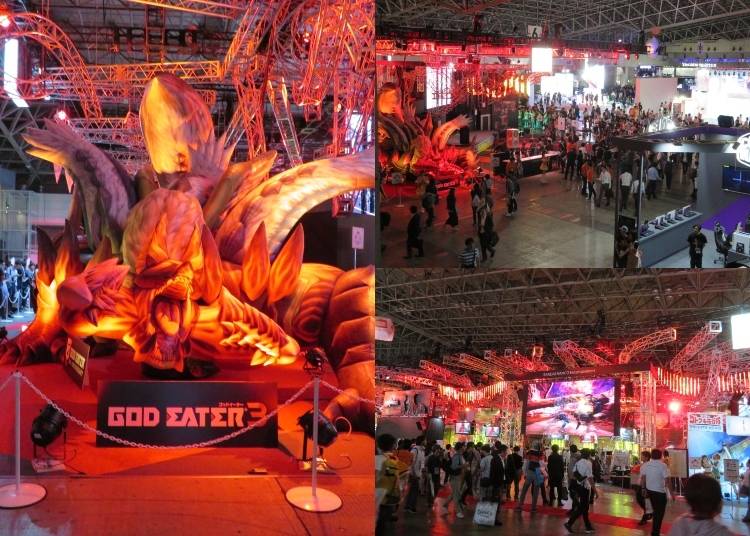
Finally, the most anticipated title over at Bandai-Namco was the action-RPG God Eater 3, from a series which made its debut on the PSP back in 2010. While perhaps not the biggest money-grabber overseas, God Eater has had huge success in Japan as players battle against huge monsters known as Aragami. After a series of remakes, side-stories, and even an online version, God Eater 3 will be the next installment in the main storyline after its previous title released five years ago. The game is set to launch in Japan on December 13, with no world-wide release date yet decided.
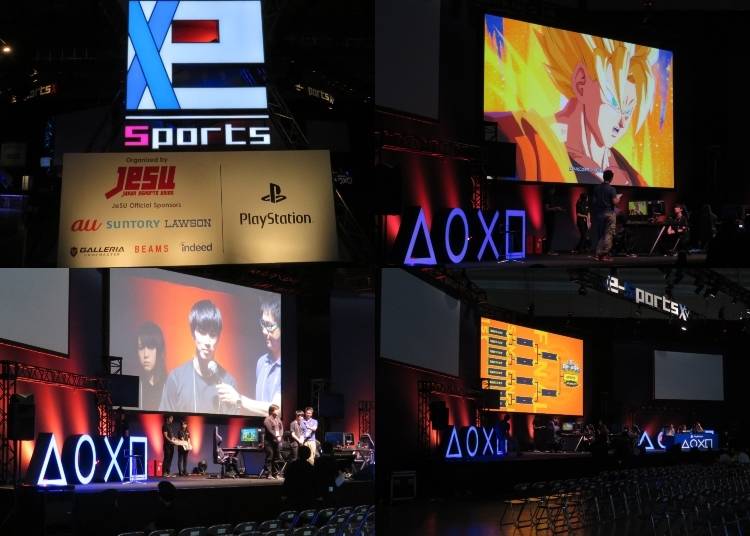
After slurping up some ramen for lunch at the Event Hall, I headed over to International Exhibition Hall, where many of the Indie games were on display, as well as the VR titles, shops, and the e-Sports Arena.
Coming to the Tokyo Game Show on the Business Day meant there wasn't much happening at the e-Sports arena, except for introducing some players to a vast area of empty chairs. But all the action will be happening on the Open Day of TGS. Saturday will see competitions on the popular smartphone game Puzzle & Dragons, followed by a battle royale on Fortnite, a tournament with the first-person shooter Call of Duty: WWII, and ending things with players clashing on the fighting game Dragon Ball FighterZ. The action continues on Sunday with the puzzle-based PuyoPuyo Championship, then Konami's Winning Eleven 2019, and more fighting games with Tekken 7, followed by Street Fighter V: Arcade Edition. With the Japan e-Sports Union (JeSU) being established just this year in Spring, the 2018 Tokyo Game Show marks the first time e-Sports have been taken seriously. I can guarantee that those empty chairs I saw today will be quite full on the weekend.
On to the Indie area!
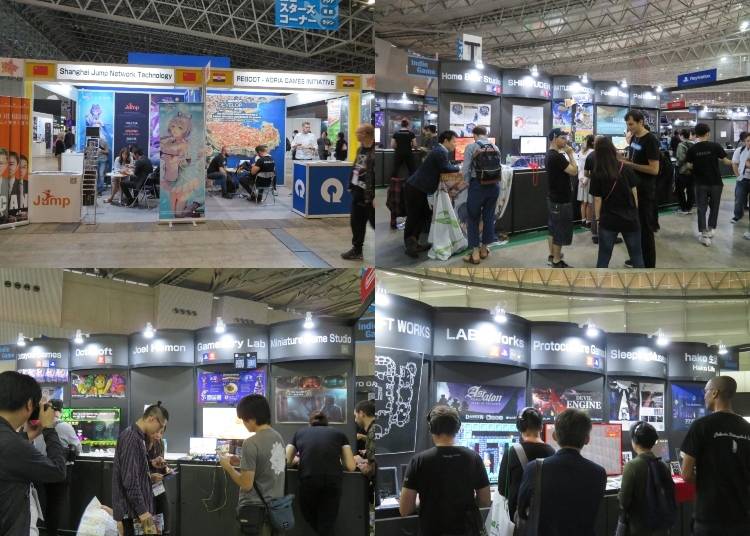
I then made my way towards the Indie area, where a slew of unique titles awaited my try. Several of these Indie developers were sponsored by Sony in hopes of having their exclusive playability on the PS4, while others paid their own bill.
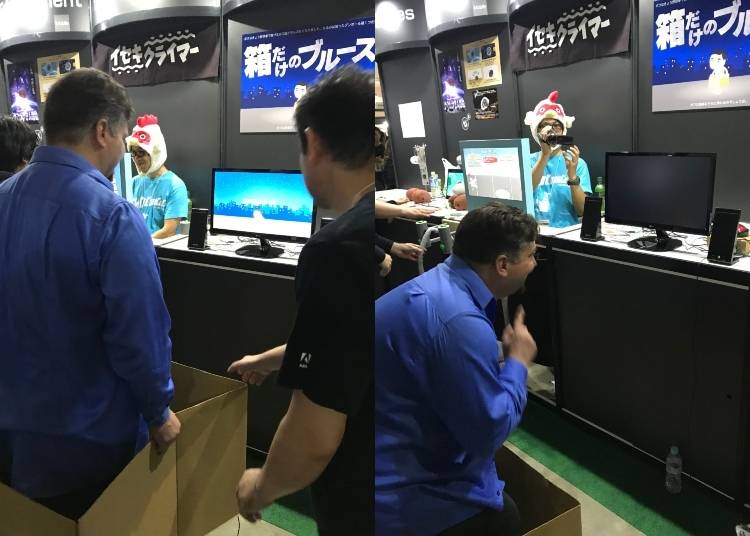
One of the more unique titles I tried was called Hako dake no Buruusu (Just a Box Blues). Players hold an ordinary cardboard box which is fastened by motion sensors. In the game, the character has lost his clothes, and is attempting to rush home while wearing only a cardboard box. Players need to run forward, and physically duck inside the box to hide by the occasional pedestrians who pass by. If you're too slow, they call the police and you're arrested for indecent exposure. I asked the developer, Wataru Nakano, if the game's idea was based on a real-life experience, but he said "No."

Another creative Indie game I tried was Iseki Kuraima (Ruins Climber) in which players compete to climb up the top of a wall by use of scrambling up and jumping from rope to rope while avoiding hazards. The game uses a real rope which you run through a loop by pulling as quickly as you can, while hitting nearby buttons to jump out of the way of spikes and falling obstacles. The game was certainly challenging, but a load of fun.
The VR Zone
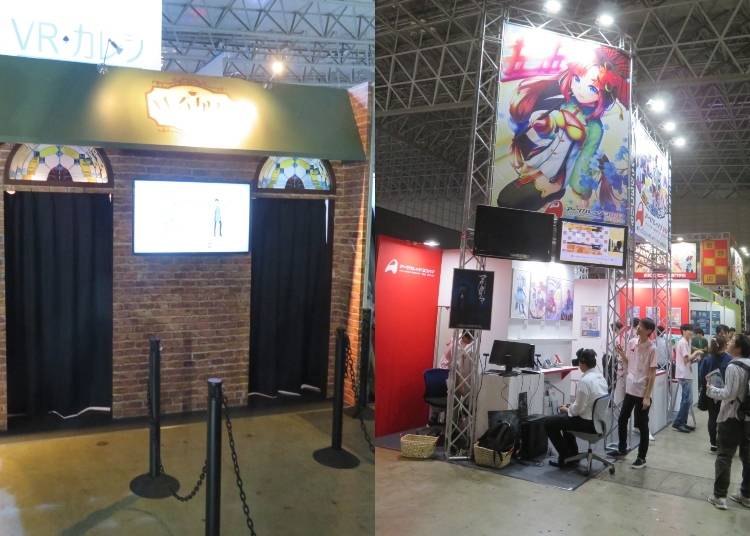
At last I visited the VR floor, which at first glance appeared significantly smaller than last year - though this was probably due to many Indie games now utilizing the VR headgear with their titles.
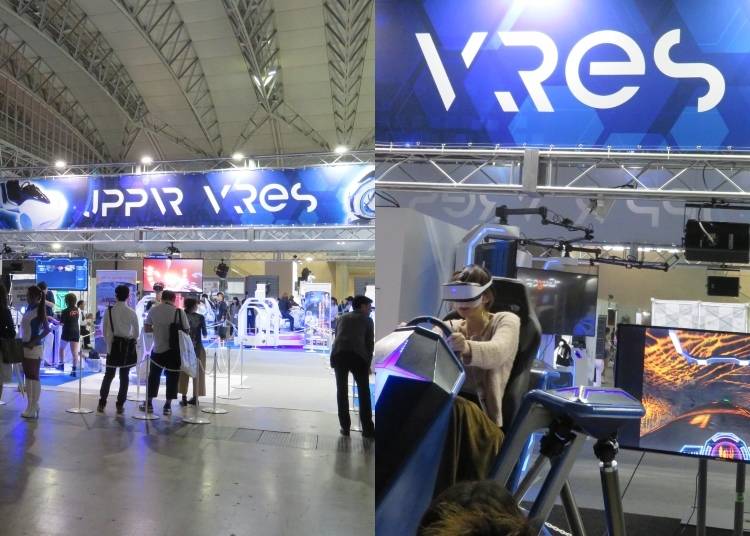
The booth for Japanese VR hardware and software developer JPPVR was at least six times larger than last year, with their hardware looking just as sleek and cool as the games themselves. There was a motorcycle racing game that resembled something out of Tron, riding a bicycle cross thin bridges while traversing from skyscraper to skyscraper, a car-racing game, and an on-rails shooter where players control a Gatling gun on top of a starship and blast away incoming enemies. While their business is targeting game arcades, I was told by a representative of JPPVR that since VR is an "experience" that's often difficult to advertise, it's important that the attraction itself look attractive to draw in curious players.

Another VR game I tried was called Last Ride by BeRISE, a Japanese company based in Hiroshima. Creating both the software and hardware, players sit in a moveable chair while wearing the VR headset, which simulated riding a cart over broken rails around the top of a building. Soon, the tracks fall apart, and you fall to your doom, while the chair jerks, shakes, and sways to further simulate the experience. The representative of BeRISE told me they were looking not only into game arcades, but anywhere their VR Chair might prove useful, such as simulating test driving at a car dealership, or experiencing zip lining at a travel agency.
By then the hall started playing Auld Lang Syne to indicate it was time for visitors to think about leaving. My feet were sore and I was exhausted, but quite satisfied with my experience at the 2018 Tokyo Game Show. Their theme, "Welcome to the Next Stage," seemed a fitting title. In the last few years, we've seen drastic changes in the gaming industry, putting stress on both hardware and software developers as they tried to sort out through the confusion.
But now the dust has settled after the battle between the console and smartphone games, and each have seemed to rest comfortably in their respective corners of the gaming market. Indie games have gone from being looked down on, to risen high up on a pedestal, and are now simply accepted as their own genre, free to come up with their own unique titles to add that creative flare to the market. Only the VR market still seems unknown at this point, not yet determined if it will grow as VR device prices decrease, or fade like a burned-out trend. But this little mystery in the market gives us something to look forward to in the next stage of gaming.
Damon Finos was born in Toronto, Canada, and has been living in Japan for 20 years. He has written several ESL textbooks, published short stories and flash fiction in online magazines, and articles for Trophy-Hunter.net, a website which focuses on gaming news, tips, and strategies. He has been playing video games nearly his entire life.
- Area
- Category
*Prices and options mentioned are subject to change.
*Unless stated otherwise, all prices include tax.
Popular Tours & Activitiess
Recommended places for you
-

Top 3 OSHI MAPs for the Best Matcha and Sweets in Tokyo
by: Guest Contributor
-

Where to Buy a Japanese Kitchen Knife? Why Travelers Choose MUSASHI JAPAN's 14 Stores in Tokyo, Kyoto, and Nara
by: Guest Contributor
-
Ad

Discover Tokunoshima, The Hidden Paradise in Southern Japan
-
Ad

What Makes Japanese Yakiniku So Darn Good? Guide to Cuts, Heat, and Wagyu Know-How
-

To the Holy Land of Kawaii! Odakyu Tama Center Station Is Becoming a Dreamy Sanrio Wonderland
by: Guest Contributor
-
Ad

In the Heart of Japan: Why Gifu City Deserves a Spot on Your Itinerary (Cormorant Fishing, Gifu Castle, Nightlife & More!)
-

Tokyo Roppongi: 5 Most Amazing Spots at Roppongi Hills and How to Make the Best of Them!
-

Hong Kong Week 2018: Get a Taste of Hong Kong—For 2 Weeks—Right Here in Tokyo!
-

Shibuya Tour: Explore All of Shibuya With This Free Walking Tour!
-

10 Important Japanese Phrases to Know Before You Enter a Japanese Convenience Store
by: Teni Wada
-

What to Pack for Japan: 8 Essential Things for a Hassle-Free Trip
-

[MOVIE] “Your Name” Conquers Tokyo’s Winter – Discover the Wondrous Illuminations at Tokyo Michiterasu 2016
- #best ramen tokyo
- #what to buy in ameyoko
- #what to bring to japan
- #new years in tokyo
- #best izakaya shinjuku
- #things to do tokyo
- #japanese nail trends
- #what to do in odaiba
- #onsen tattoo friendly tokyo
- #daiso
- #best sushi ginza
- #japanese convenience store snacks
- #best yakiniku shibuya
- #japanese fashion culture
- #best japanese soft drinks




















